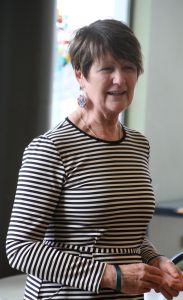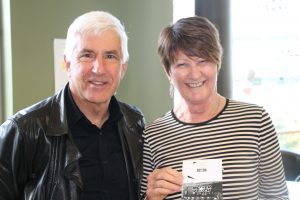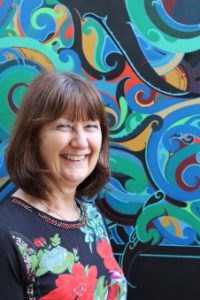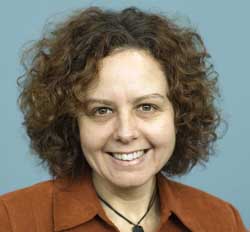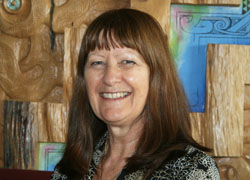He poroporoaki ki a Dr Lyn Carter
Te Tumu is seeing further staff changes with the retirement of another senior staff member, Dr Lyn Carter who, most recently, has been the Programme Coordinator of our Indigenous Development programme. Lyn was farewelled today at Te Tumu, accompanied by friends and colleagues from Te Tumu and the wider university, and by members of Kāti Huirapa ki Puketeraki.
Lyn was born in Christchurch but lived a large part of her life in the North Island, first in Hastings then in Auckland. Her dad’s parents emigrated from England after the First World War, and on her mother’s side she has links to early Scottish settlers – her great-grandparents had a boat building business at the bottom of Wharf Street in Dunedin. Her Kāi Tahu connections (Kāti Huirapa, Kāti Hawea, Kāti Ruahikihiki, with connections to Te Whānau a Apanui through the Stirling whānau) also come through her mother and grandmother through the Wybrow whānau.
After taking a few extra-mural papers at Massey as a young mum, Lyn enrolled a few years later at the University of Auckland as a mature student (known as “adult learners” at the time), and completed a BA, MA and PhD, all in both Social Anthropology and Māori Studies. She had some stellar names as supervisors for her postgrad study, such as Patu Hōhepa and Ngāpare Hopa, Sir Hugh Kāwharu and Andrew Sharpe. Lyn’s MA investigated “how oral traditions verify place on the landscape – this meant looking at the whakapapa relationships that make us who we are”. Her PhD, completed in 2003, was “Whakapapa and the State: Some Case Studies in the Impact of Central Government on Traditionally Organised Māori Groups”. Lyn says that she “steered slightly away from [her MA topic] with my PhD research mainly because of the circumstances surround Kai Tahu at the time. The treaty settlement negotiations and the eventual settlement made me think quite a lot about how being registered with an iwi could skew whakapapa from being the underlying force of identity and connections, relationships and so on, to becoming a name on a registration list. So I looked at how treaty settlement structures impacted on tradition-based whakapapa.” The thesis caused some debate within Ngāi Tahu circles.
Lyn undertook a variety of roles at the University of Auckland. She tutored for Jane McRae’s oral traditions papers, and through Jane and Jenny Curnow she became part of a team, in a Marsden-funded project, to develop English-language abstracts for articles in the Niupepa Māori corpus. These abstracts allow researchers who do not read Māori a window into the many Maori language newspapers from the nineteenth and early twentieth century. Lyn was also offered the lectureship teaching Ranginui Walker’s old paper, Maori Society, and developing further papers in contemporary Maori Society and Governance. During this time Lyn also fitted in a year teaching in the history programme at the University of Canterbury.
Lyn went on to become the Director of the School of Māori Development and Humanities, Waiariki Institute of Technology in Rotorua. Later, she moved to Te Whare Wānanga o Awanuiārangi in Whakatāne as Interim Director to develop and implement the Centre for Post Treaty Settlement Futures, working alongside Professor Tā Hirini Moko Mead and Tā Wira Gardiner. This work developed from her PhD research around settlement structures and governance challenges. While at Awanuiārangi, Lyn also held a position as Professor of Anthropology in the Post Graduate School, which involved both teaching and research.
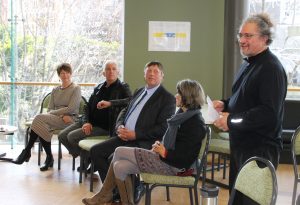
Poia Rewi (R) farewelling Lyn on behalf of Te Tumu. From left, Lyn and John, Matapura Ellison, and Katharina Ruckstuhl.
In 2011 Lyn joined us in Te Tumu. She says “I have worked with some really good and dedicated people here”. She is an active staff member, whose teaching and leadership has mainly been within our Indigenous Development programme. She has also formed excellent links with colleagues from other academic units, such as Geography and the Centre for Sustainability.
Coming to Otago allowed Lyn to engage more fully with her local Kāi Tahu connections. While she was in Auckland she helped found (with Hirini Matunga and Kepa Morgan) the taura here group, Kai Tahu ki Tamaki Makaurau. She already owned a crib at Warrington, so also used to attend various things at Puketeraki Marae at Karitāne so when she eventually moved down here to the University of Otago she was already involved to some extent with the marae – that spread to being on various committees and becoming very much part of the day-to-day life. She says “When I had my stroke I lived in our kaumatua house next door to the Runaka offices and that was amazing – such great support and whanaukataka from just living that close. I used to say that living away one could still participate, and yes you can, but I now realise that it is not the same as being in the landscape and rejoining with the whenua.”
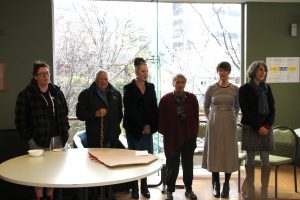
Megan Pōtiki, Hinerangi Ferrall-Heath, Janine Kapa, Khyla Russell, Lyn Carter, and Katharina Ruckstuhl.
Lyn was able to capitalise on her connections to Puketeraki in her popular paper, INDV301: Māori and Indigenous Development, Ethics and Governance, which not only provided students with theoretical tools, but took them outside the classroom for practical work with iwi and community groups on local projects.
Lyn’s research has followed a circular path with her current research interests drawing on her earlier research on how oral traditions verify place on the landscape. “I have now gone full circle and concentrate on place naming and landscape and identity – this led to me working with Sami researchers in arctic Norway where awareness of landscape and place naming shapes their existence. My research focus for the past 14 years has been on landscape and identity and in particular how place names can act as environmental indicators for landscape changes over time – more recently in the context of climate change. Again this is a key area working with Associate Professor Kaisa Helander in Gouvdageaidnu, the Sami capital in northern Norway.”
Lyn has many highlights from her academic career to look back on. “There are so many really – teaching has always been rewarding and seeing post-grad and graduate students develop and flourish has been great – brings truth to the whakatauki about new nets taking over from the old in terms of legacy for future Maori academics at universities. Each generation is the legacy of another. I have always felt privileged to have worked with people like Patu Hohepa, Bruce Biggs, Margaret Mutu, Ranginui Walker, Wairete Norman, Hugh Kawharu, up at Auckland – The ones who were instrumental in developing Maori Studies at a University and also getting the marae in place there.
“Te Wananga o Waipapa Marae never seemed like a University Department – more of a meeting of Maori minds. I remember we all took part in the Foreshore and Seabed march across the Harbour Bridge and hosted and supported the various hui and protest groups at Waipapa Marae – in some ways the Department operated as a marae, and the various protests were Maori society in action – Never sure though if many of the students appreciated it all LOL. But those were different times.
“What I have particularly liked at Otago is the whakawhanaukataka between Maori academics and staff on campus and how that brings Maori together from all disciplines – Maori first and that underpins academia.
“Perhaps the main highlights then are all the people I have met and worked with in some capacity and the broadening of mind and thought that that brings with it; not to mention the conferences and research projects that have stretched my own knowledge and capabilities for the better – I have discovered that yes, we are always learning.”
In 2018, Lyn published Indigenous Pacific Approaches to Climate Change: Aotearoa/New Zealand, published as part of Palgrave’s Studies in Disaster Anthropology Series. Click here to access the e-book. This was a sister volume to former Te Tumu academic, Jenny Bryant-Tokalau’s Indigenous Pacific Approaches to Climate Change: Pacific Island Countries.
Lyn says, “Publishing my book on climate change was an achievement – after my stroke I had three key goals and finishing that book was one of them. The others were seeing more of my mokos, and getting back on my motorbike.”
Indeed motorbike trips feature heavily in Lyn and her partner John’s retirement plans. This includes “extended touring around Te Waipoumanu and Aotearoa and visits with the mokos”, although she “may be delayed from going to London for a bit yet to see my son and whānau“. Lyn still has some work for Kāti Huirapa that she is continuing on with, but she says “I pretty much hope to do ABSOLUTELY NOTHING for a little while”.
He mihi nunui ki a koe, e hine; kāore e kore ka haere tonu āu mahi. Heoi, ko tō te Tumu tūmanako, ka harikoa, ka pārekareka hoki ngā tau maha o tō rītaiatanga.
Fingers Crossed for Marsden Second Round
Te Pūtea Rangahau a Marsden/Marsden Fund is one of the most prestigious opportunities for externally-funded research grants, and highly competitive. The grants fund three-year research projects, as well as channel some income into the university. The Marsden Fund operates as a two-stage process. Although the quality of all the initial applications (where the research idea is pitched) tends to be very high, most applicants do not get invited to submit a full proposal. In the Humanities Panel just 26.1% got through to the second round, and in Social Sciences it was 22.6%. At the second round successfully gaining a grant then becomes a (roughly) 50/50 chance. So we can see, winning a Marsden is very hard, and getting through to the second round is worth acknowledging and celebrating.
It will now be an anxious time for our Te Tumu staff, Dr Lyn Carter and Dr Erica Newman, involved in preparing their full proposals.
Dr Lyn Carter is part of larger team led by Dr Pedersen Zari of Victoria University, with the project: Empowering Oceania Nature-based Urban Design: Knowledge sharing, Leadership and community Partnering in Climate Change Adaptation. This is a “standard” Marsden application, i.e. submitted by experienced researchers, most often as a team.
Summary: Climate change impacts settlements of Oceania, including Aotearoa, in significant ways. ‘Nature-based solutions’ (NbS) have great potential to address these impacts. Incorporating traditional knowledge into NbS will offer more culturally appropriate and long-term solutions, however links to wellbeing agendas have not been fully explored. This research investigates how well being can be strategically linked to ecologies, and how this can be harnessed to create ecologically resilient ‘Ocean cities’. Research into how the human-nature-climate nexus can be leveraged to enhance the effectiveness of NbS will make a significant contribution to the urban climate adaptation research in Aotearoa, the Pacific, and globally.
Dr Erica Newman project is a “fast-start” application, which are for early career researchers, often working by themselves. Her topic is: Journey Home: Descendants of Māori adoptees search for their tūrangawaewae.
Summary: Māori adoptees who have no knowledge of their Māori heritage pass the unknown to their descendants. Focusing on these descendants, this project will explore; how they identify with their taha Māori, avenues they have taken to connect to their taha Māori, and how they are accepted by their whānau and hapū. I will follow participants on their journey of discovery and will examine hapū membership eligibility. Oral narratives will be the primary base for this project with published and unpublished sources used to support and highlight issues the participants encounter. This will begin a new area of research that will highlight the issues of transracial adoption on identity and well-being for descendants of Māori adoptees in Aotearoa New Zealand. [Advisor: Associate Professor Angela Wanhalla.]
We all have our fingers crossed that Erica and Lyn’s projects make it through.
Publishing award
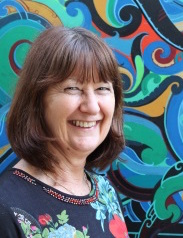 Congratulations to Lyn Carter, the coordinator of our Indigenous Development Programme, for her recent article co-written with Janet Stephenson (Centre for Sustainability) and Claire Freeman (Geography) from Otago, and others in the journal Society & Natural Resources.
Congratulations to Lyn Carter, the coordinator of our Indigenous Development Programme, for her recent article co-written with Janet Stephenson (Centre for Sustainability) and Claire Freeman (Geography) from Otago, and others in the journal Society & Natural Resources.
The article won the S & NR best publication award for 2019. Click on the link to read it: Hybrid Neoliberalism Implications for Sustainable Development
Journal News
Dr Lyn Carter is a Senior Lecturer in Te Tumu, and the Coordinator of our Indigenous Development programme.
Marginalisation occurs when a group of people are pushed to the periphery of a society. Many Māori reside at the margins of ‘mainstream’ society, while others are at the margins of Māori society. The present paper explores how ‘by Māori, for Māori’ research and evaluation can create spaces for voices from the margins to be heard. The paper arose out of a series of hui in which papers on the notion of marginalisation and Māori were presented and discussed, along with the broader topic of research ethics and protocols. Three themes that emerged from these hui are considered in this paper: relationships between researchers and participants/communities, researchers knowing themselves, and the safety aspects inherent within tikanga. The discussion of these themes draws upon the papers that were written for this project, the feedback from hui participants (researchers, students, health professionals, government workers, community providers), and local and international literature on research ‘by and with’ indigenous peoples. In making the ‘knowing’ we hold about these issues more explicit, this paper aims to generate more discussion as well as provide some small guidance for those who may be new to this thing called ‘research’.
The Journal of the Polynesian Society has been going for a little longer…
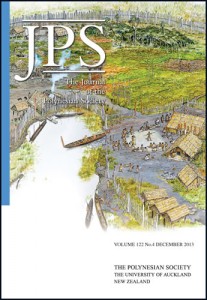 9 Reasons to Publish in the Journal of the Polynesian Society
9 Reasons to Publish in the Journal of the Polynesian Society
- For nearly 125 years, an international forum for the dissemination and discussion of cross-disciplinary research of and by Pacific peoples (broadly defined), past, traditional, and contemporary.
- Submissions welcomed from anthropology, linguistics, history, politics, sociology, visual arts and material culture studies, archaeology, biological anthropology, indigenous studies, and cultural geography
- Issues published quarterly, peer-reviewed; full length research articles (up to 15,000 words) and shorter communications
- Member of CrossRef index service, articles DOI-supported, Journal of Citation Reports rated
- Rapid submission-to-print turn-around time
- Guest-edited Special Issues welcomed & available for one-off purchase
Links:

